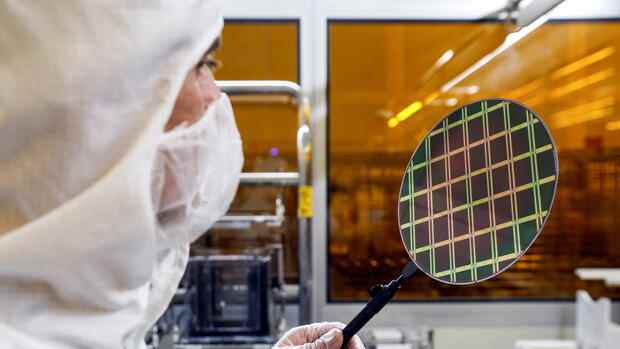Bottlenecks should be avoided.
(Photo: REUTERS)
Brussels The US government and the European Commission want to use a close-meshed monitoring mechanism to detect a shortage of semiconductors at an early stage. Experts from both sides are to meet every two weeks and exchange information about possible risks. This emerges from the final documents of the TTC working groups, which meet this Sunday and Monday in Paris.
In the transatlantic Trade and Technology Council (TTC) the EU and the USA exchange information about common trade interests. It is chaired by three EU commissioners and three US ministers. There are also ten working groups with technical experts.
The working group on semiconductors will decide on a two-month test phase for a monitoring mechanism. There will then be recommendations as to whether and how this mechanism can be continued.
The measure shows how seriously both sides still take the risk of chip shortages. “We share the view that the persistent mismatch between supply and demand will not decrease in the near future,” their joint document read. The shortage had increased drastically during the Corona crisis. However, bottlenecks in production capacities, raw materials and in assembly, testing and packaging capacities continued to threaten.
Top jobs of the day
Find the best jobs now and
be notified by email.
Read here: Transatlantic Energy Pact: US President Biden makes firm delivery commitments for liquid gas to the EU
Investments in the billions in in-house chip production are currently being promoted both in the USA and in the EU. This should reduce the risk for the supply chains and at the same time reduce the strategic dependence on the supplier China.
The TTC will also state that there must not be a subsidy race in which companies demand ever higher subsidies. That is why the partners want to inform each other about subsidies granted and exchange information about the purpose, form, amount and recipient of the funds.
“The early warning mechanism for the chips that are now being manufactured on both sides of the Atlantic with state subsidies can help to avoid distortions of competition and at the same time make the funding really effective,” says MEP Andreas Schwab (CDU). “In this way, the strategic independence of the West can also be achieved more quickly.”
Regulating artificial intelligence together
There is further progress in the TTC working group on technical standards. Many of the new technologies related to artificial intelligence are being developed in Asia. The West wants to catch up and needs rules that are as uniform as possible.
“We are working on the development of common metrics and methods for measuring the trustworthiness of AI and AI risks,” says the final document. A timetable for this should be ready by the next meeting.
Both sides are working on definitions of which forms of artificial intelligence are to be regarded as risky, but so far they have been proceeding independently of each other. In the future, they want to coordinate closely.
More: The EU and the USA want to become independent of Russian energy and Chinese technology
